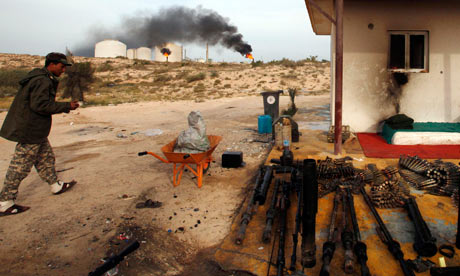Libyan unrest sends oil prices soaring to $124 a barrel
Gold and silver prices also rally amid uncertainty caused by problems in the Middle East

A rebel inside the oil terminal in Zueitina, Libya after it was retaken from Muammar Gaddafi's forces on 27 March. Photograph: Suhaib Salem/Reuters
Oil has breached the $124-a-barrel mark for the first time since August 2008 after attacks on Libyan oil fields raised concerns about supply.
Brent crude surged by $1.05, or 1%, to $124.65 a barrel on Friday, while US crude jumped by 98 cents to $111.90, its highest level since September 2008.
The price rises continue as fears mount that unrest in the Middle East could spread at a time when demand is increasing on the back ofstrengthening economies in countries such as China and the US.
The weakening US dollar, which has been sliding as American politicians battle to prevent the federal government shutting down at midnight on Friday, also drove up commodity prices.
The protests in the Middle East, which have resulted in the overthrow of regimes in Tunisia and Egypt and the ongoing fighting in Libya, have added between $20 and $25 to the price of a barrel of oil in recent months, according to Mike Wittner, head of commodities research at Sociéte Générale.
On Thursday, the International Monetary Fund (IMF) added to concerns about oil prices when it warned that demand growth would outstrip supply growth in the coming years, potentially pushing prices even higher.
The IMF predicted the oil price could rise to around the record $147 reached in July 2008. Meanwhile, a Reuters poll of 32 major oil traders predicted that oil prices would exceed $130 towards the end of 2011.
This week saw the first oil exports from Libya in nearly three weeks afterrebels sold an estimated $125m worth to Vitol, the Swiss energy trader. It had been hoped that this cargo – from the rebel-controlled Arabian Gulf Oil Company (Agoco) in the oil-rich east of Libya – would be the first of many as Agoco stepped up production after a period of inactivity due to the war.
Doubts about how much oil can be exported from the country while the battles continue have increased, however, after attacks on the Messla and Sarir oil fields in the Sirte Basin region, which holds about 80% of Libya's proven reserves. There has also been damage to vital infrastructure. Rebels and forces loyal to president Muammar Gaddafi have exchanged accusations over who is responsible for the attacks.
Gold also nudged upwards to a new record high of $1,465 an ounce, with silver breaking over the $40-per-ounce mark for the first time since 1980.
Inflation concerns
The soaring price of oil, as well as other commodities such as gold and food, have increased inflationary pressures around the world.
"Oil prices are at a point where we could begin to see demand destruction," said Wittner.
"It already looks like the United States may just be showing some signs of demand destruction. The US is always the country where you see the impact the most because there are no subsidies and hardly any tax burden."
Steven Chu, the US energy secretary, warned on Thursday about the dangers of rising oil prices as he welcomed Agoco's sale this week.
"The oil producer countries and the oil consuming countries are concerned because it does have an impact on a very fragile economic recovery," he said. "There is great concern.
"The United States is supportive of that [rebel oil] sale and is supportive of the Libyan transitional government for that sale."
No comments:
Post a Comment